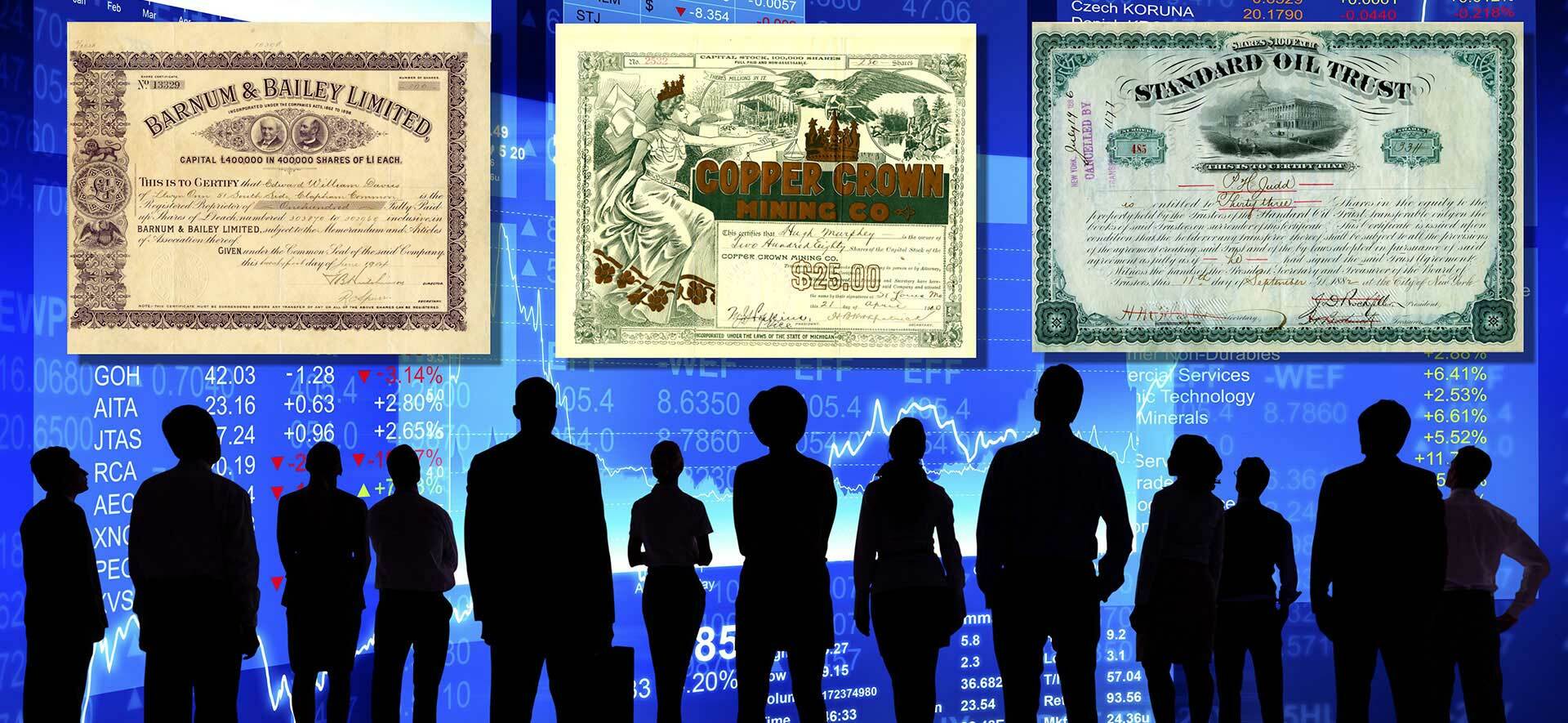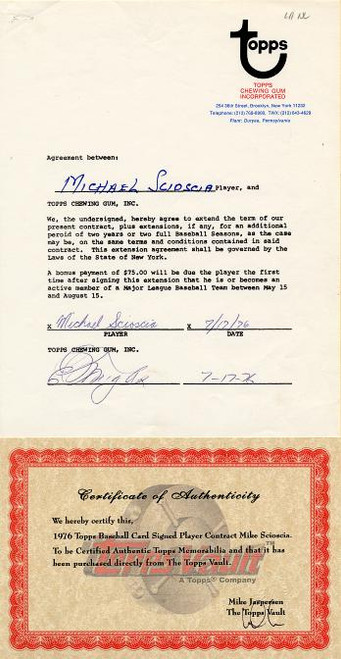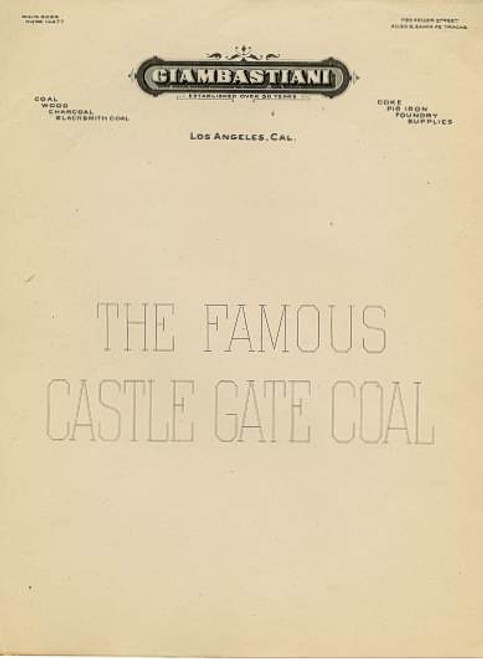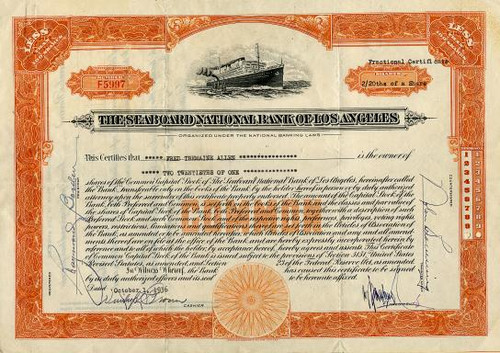Beautifully engraved SPECIMEN certificate from Hollywood Park, Inc. This historic document was printed by Thomas de la Rue and has an ornate border around it with a vignette of the company logo. This item has the printed signatures of the Company's Chairman of the Board and Secretary. 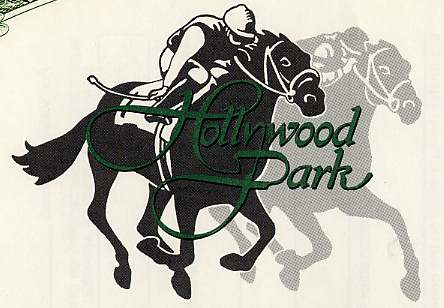
Certificate Vignette Hollywood Park, later sold and referred to as Betfair Hollywood Park, was a thoroughbred race course until it was shut down for racing and training in December 2013. The casino remains open, containing a poker card room located in Inglewood, California, about 3 miles (5 km) from Los Angeles International Airport and adjacent to the Forum indoor arena. It will be the site of Los Angeles Entertainment Center, home of the Los Angeles Rams of the National Football League, when the stadium is completed in 2019. Until then, the Rams will temporarily play home games at the Los Angeles Memorial Coliseum for the next three seasons starting in 2016. Hollywood Park Entertainment was established in 1938 and incorporated in 1981 under the name Hollywood Park Realty Enterprises, Inc. In 1992, it was renamed Hollywood Park, Inc. Opening Day - June 10, 1938 The Hollywood Turf Club was formed under the chairmanship of Jack L. Warner (of the Warner Brothers film corporation). The 600 original shareholders included many stars, directors and producers of the film world, such as Al Jolson and Raoul Walsh (two of the original directors of the board), Joan Blondell, Ronald Colman, Walt Disney, Bing Crosby, Sam Goldwyn, Darryl Zanuck, George Jessel, Ralph Bellamy, Hal Wallis, Anatole Litvak, Hunt Stromberg, Wallace Beery, Irene Dunne and the late Mervyn LeRoy (director of Hollywood Park from 1941 until his death in 1986). First Film Patrol The "binocular camera", a lightweight movie camera attached to binoculars, was introduced in 1941. It was used by eight patrol judges, each recording a section of the race. The film was spliced and viewed by the stewards the following morning. This system was refined in 1945 when cameras were installed in towers. Racing Suspended During World War II Hollywood Park was used as a storage facility from 1942-44 in association with the war effort, opening only for a brief War Charities meeting in November, 1944. First Transcontinental Air Shipper Woolford Farm's Historian traveled by air from Chicago to start in the 1946 Gold Cup - the first time a runner was shipped by air to compete in a specific race. He finished third, but later equaled a then-world record in winning the 1 5/8-mile Sunset Handicap. Fire of 1949 Two weeks before the 1949 meeting the grandstand and clubhouse became a quarter-mile-long inferno. The '49 summer meeting was conducted at Santa Anita, with Hollywood Park re-opening in the summer of 1950. Million-Dollar Horse Citation became racing's first million-dollar earner by winning the 1951 Hollywood Gold Cup under Steve Brooks while making his final start. Triple Dead-Heat First triple dead-heat for win at Hollywood Park occurred on July 3, 1957, when $5,000 claimers Joe's Pleasure (George Taniguchi), Challenger Tom (Bill Shoemaker) and Leaful (William Harmatz) could not be separated. Turf Course Opens The Lakeside Turf Course, featuring four chutes, opened on May 10, 1967. Old Mose, with Jerry Lambert up, won the first race on the course. Exacta Wagering Hollywood Park pioneered the exacta in 1971. Major Expansion A $3 million expansion project in 1972 doubled the size of the Turf Club, added the Winner's Circle Dining Room to the Clubhouse, and renovated the stable area. Match Race Glen Hill Farm's Convenience, trained by Willard Proctor and ridden by Jerry Lambert, defeated Westerly Stud's favored Typecast (Bill Shoemaker up) in a 1972 match race which drew 53,575 to Hollywood Park. Convenience won the $250,000 winner-take-all-purse by a head, covering 1 1/8 miles in 1:47 3/5. Sunday Racing Sunday racing was introduced to Californians at Hollywood Park on April 15, 1973. (The legislation was introduced under Gov. Ronald Reagan's administration.) Handle Record Hollywood Park became the first track to average more than $4 million in daily handle in 1977. Wagering Revolutionized Amtote's TM 300 wagering system revolutionized wagering habits in 1979 with multiple bet tickets and betting and cashing at the same window. Early Bird Wagering was also introduced. Two-Million Dollar Horse Harbor View Farm's Affirmed became racing's first $2-million winner with a victory in the 1979 Hollywood Gold Cup under jockey Laffit Pincay Jr. Attendance Record Hollywood Park, a trendsetter in giveaway premiums, attracted a record crowd of 80,348 with a tote bag giveaway on May 4, 1980. Pick Six The Pick Six, an exciting and successful innovation in California and a forerunner to the Perfect Six, was introduced at Hollywood Park by Vernon O. Underwood on June 7, 1980. Miss Musket-Chris Evert Aaron U. Jones' western standout Chris Evert, with Laffit Pincay Jr., defeated Carl Rosen's eastern star Miss Musket, ridden by Jorge Velasquez, by 50 lengths in a 1974 match race. Each owner put up $100,000 and the track added $150,000 for record purse of $350,000. Handle Record Hollywood Park became the first track to average more than $5 million in mutuel handle in 1980. Perfect Six The Perfect Six was introduced to the U.S. on June 24, 1983. The bet, now known as the Pick Six, introduced the popular carryover provision. Four-Million Dollar Horse Dotsam Stable's seven-time Eclipse Award winner John Henry became the first horse to surpass $4 million in career earnings with a win in the 1983 Hollywood Turf Cup under jockey Chris McCarron. Million-Dollar Race With a purse of $1,049,725, the 1983 Hollywood Futurity was not only the first million-dollar race for Thoroughbred 2-year-olds, it was the richest race staged for Thoroughbreds at the time. Sandy Hawley rode Gary Jones trainee Fali Time to victory for owners James L. Mamakos and Dr. Marc Stubrin. New Main Track The 1 1/8-mile main track, incorporating a 1,321-foot stretch, was opened on Nov. 7, 1984. The extended chute permits one-mile races around one turn. Inaugural Breeders' Cup Before a crowd of 64,625 and an estimated 50 million viewers, Hollywood Park was host to the inaugural Breeders' Cup on Nov. 7, 1984, handling a then-record $11,466,941. Off-Track Wagering Outlets Hollywood Park blazed the trail for off-track wagering in Southern California, with outlets at Del Mar, San Bernardino and Ventura during the 1987 autumn meeting. The three outlets handled $143,218,724 during the 27-day stand, an average of $855,881. Breeders' Cup Day Hollywood Park became the first track to host a second Breeders' Cup, setting a handle record of $14,352,515 on Nov. 21, 1987. The national handle of $36,398,366 was also a single-day standard. Juvenile Millionaire Tejano won the 1987 Hollywood Futurity to become racing's first juvenile millionaire. Hubbard Assumes Control R.D. Hubbard gained control of Hollywood Park in February, 1991, following a lengthy proxy battle. Phase One of a massive facelift to restore the track's "Lakes and Flowers" image began the next day. During his first meeting as Chairman of the Board and CEO, attendance increased 11.3% and handle rose 7.3%. Hollywood Renaissance - Phase One The European style Garden Paddock was constructed during Phase One of a $20-million reconstruction project prior to the 1991 spring/summer meeting. A second major change, moving the finish line to its original location, helped put the general public closer to the action. Other improvements included the introduction of the Players' Club and Study Hall; refurbishing of the admission areas, the clubhouse and grandstand; new signage at the corner of Prairie and Century; and a jogging track on the perimeter of the Hollywood Park property. Friday Night Racing The success of six Friday night cards at the 1991 spring/summer meeting led to 12 Fridays in the summer of 1993, and a full slate of Fridays through the 1998 Spring/Summer meet. (Regular Friday night racing returned in 2000.) Hollywood Renaissance - Phase Two Phase Two of the reconstruction project took place after the summer meeting with the dredging of new infield lakes, the construction of the swank Hollywood Bar and six new barns, the addition of the North Park for families, and the refurbishment of the Turf Club and Directors' Room. Turf Festival The Turf Festival, a series of six grass races which attracts turf stars from across the country and Europe, was introduced at the 1991 Autumn Meeting. Quarantine Barn The Quarantine Barn, with four, six-stall sections, was constructed adjacent to the main stable gate for the 1992 Autumn Meeting. This facility permits international shippers to come directly to Hollywood Park upon arrival at Los Angeles International Airport. Threewitt/Whittingham Lounge The 3,000-square foot Noble Threewitt/Charlie Whittingham Horsemen's Lounge opened in December, 1993. Bet-A-Buck Bet-A-Buck, a win-place Pick Nine, was added to the wagering format in 1992. Also added were the $1 Trifecta, $2 Late Double and $1 wagers at self-service machines. Superfecta/Rolling Pick 3s The $1 Superfecta - picking the first four finishers in order - was introduced before the 1993 spring/summer meeting. Rolling Pick 3s were added during the '93 stand. North-South Simulcasting The introduction of full card simulcasting from Northern California in the spring/summer meet of 1994 and the success of Friday nights contributed to a record spring/summer average handle of $8.1 million. The trend continued in the 1994 Autumn Meeting and into 1995. Record Purses Daily purses averaged $340,296 at the 1994 Autumn Meeting - a Hollywood Park record. Hollywood Park-Casino The $20-million Hollywood Park-Casino was opened on Friday, July 1, 1994. Previously known as the Pavilion, the state-of-the-art card club/casino features California games and poker. It became an inter-track hit with simulcasts from within the State, throughout the U.S., and from Hong Kong. Turf Paradise Hollywood Park announced the purchase of Turf Paradise in Phoenix, Arizona, in 1994. Vision Board A full-color Toscolor vision board, which measures 30' x 16', was installed next to the infield tote board for the 1995 spring/summer meeting. Action Around the Clock For the first time, Hollywood Park imported and exported races to Canada. The continuing simulcasts from Northern California and Hong Kong throughout their season, plus the introduction of inter-track wagering from New York State contributed to a record daily average handle of $10.3 million during the 1995 Hollywood Park spring/summer meeting. The common pool average of $9,618,258 was up 18% from the 1994 figure and an unprecedented $644,423,260 was wagered, contributing to record daily purses of $382,838 - an 8% increase from 1994. Record Single-Day Handle A Hollywood Park record $21,287,723 was wagered on 1995 Kentucky Derby Day. The mutuel pool on the first leg of the Triple Crown Classic of $4,621,694 was a state record as were the exacta and trifecta pools. California Record Wagered on Cigar California records of $377,880 to win and $524,348 across the board were wagered on Cigar in the 1995 Hollywood Gold Cup. The two-time Horse of the Year rewarded his backers by winning the race by 3 1/2 lengths to return $3.80. Third Breeders' Cup Championship Hollywood Park hosted the Breeders' Cup Championship for third time - first during R.D. Hubbard's reign - and established a Southern California record handle (all sources) of $79,741,030. The on-track crowd of 51,161 was the largest in 10 years, but the day was flawless with smooth traffic flow into the track and championship racing on the track. Five winners clinched Eclipse Awards, including undefeated Favorite Trick, the first 2-year-old to be crowned Horse of the Year since Secretariat in 1972. Walkover, Triple Dead-Heat A day unmatched in racing lore came Sunday, Dec. 7, 1997, when a walkover in the Bayakoa Stakes was followed three races later by a triple dead-heat. Sharp Cat participated in the first walkover in Hollywood Park history and the first at a major track since Spectacular Bid in the 1980 Woodward at Belmont Park. Just 90 minutes later, Tina Celesta, Chans Pearl and Cool Miss Ann finished in a dead-heat for first in the day's fourth race - the second triple dead-heat in track history. Growth of Gaming Division Opened Radisson Crystal Park Hotel and Casino (1996); acquired three casinos (land-based and riverboat) in Reno, New Orleans and Biloxi, Miss., through its merger with Boomtown Inc. (June 30, 1997); signed agreement with Yakima Indian Nation for construction of a casino in State of Washington (opened in 1998), and completed acquisition of Casino Magic Inc. in October, 1998. Pick 6 Guarantee Introduced guaranteed million dollar Pick 6 at 1998 spring/summer meeting. A record $3,869,771 was wagered on Hollywood Park's guaranteed $1.5-million Pick 6 on July 18, shattering the mark of $3,342,371 set June 14, when the track unveiled the popular promotion by guaranteeing a minimum Pick 6 pool of $1 million. The record $3.8 million Pick 6 pool on July 18 helped generate total handle of $18,994,274, highest in track history with the exception of Breeders' Cup and Triple Crown events. The day's handle was up 74%. Attendance Boost, Record Handle A slight increase in on-track attendance helped the 1998 Autumn Meeting attain a daily average handle of $9.1 million - a record for a non-Breeders' Cup meeting. Highest single handle came when a Hollywood Turf Cup/Hollywood Futurity card generated wagering of $15.5 million - an Autumn Meeting record (excluding Breeders' Cup). Derby Champ Captures Gold Cup Real Quiet rallied late under Hall of Fame jockey Jerry Bailey to win the 1999 Sempra Energy Hollywood Gold Cup, the first Kentucky Derby champion to capture Hollywood's premier race since Ferdinand in 1987. Real Quiet, owned by Mike Pegram and trained by Bob Baffert, is the lone horse to win the Hollywood Futurity, Kentucky Derby and Gold Cup. Churchill Downs Acquires Hollywood Park Churchill Downs Incorporated closed a $140-million transaction to acquire Hollywood Park Race Track on Sept. 10, 1999. The deal included the Hollywood Park Casino, which was leased back to Hollywood Park Inc. (now Pinnacle Entertainment Inc.) for 10 years at an annual rate of $3 million, with one 10-year renewal option. On-track handle was up 11.3% and on-track attendance was up 2.1% at the 31-day Autumn Meeting - the first under the stewardship of Churchill Downs History from company press information.
About Specimens Specimen Certificates are actual certificates that have never been issued. They were usually kept by the printers in their permanent archives as their only example of a particular certificate. Sometimes you will see a hand stamp on the certificate that says "Do not remove from file". Specimens were also used to show prospective clients different types of certificate designs that were available. Specimen certificates are usually much scarcer than issued certificates. In fact, many times they are the only way to get a certificate for a particular company because the issued certificates were redeemed and destroyed. In a few instances, Specimen certificates were made for a company but were never used because a different design was chosen by the company. These certificates are normally stamped "Specimen" or they have small holes spelling the word specimen. Most of the time they don't have a serial number, or they have a serial number of 00000.

Certificate Vignette
About Specimens Specimen Certificates are actual certificates that have never been issued. They were usually kept by the printers in their permanent archives as their only example of a particular certificate. Sometimes you will see a hand stamp on the certificate that says "Do not remove from file". Specimens were also used to show prospective clients different types of certificate designs that were available. Specimen certificates are usually much scarcer than issued certificates. In fact, many times they are the only way to get a certificate for a particular company because the issued certificates were redeemed and destroyed. In a few instances, Specimen certificates were made for a company but were never used because a different design was chosen by the company. These certificates are normally stamped "Specimen" or they have small holes spelling the word specimen. Most of the time they don't have a serial number, or they have a serial number of 00000.



